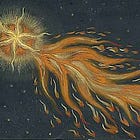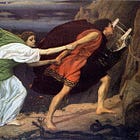how (un)ambiguous can a 65-word prose poem be?
discussing "On Walking Backwards" by Anne Carson
This is the second part of a brief prose poetry exploration. These prose poetry posts are informal supplements to the Synthesis Series, where I take a collection of excerpts and extract the lessons we should apply to writing poetry. Prose poems, despite their deceptively straightforward appearance, contain highly fragmented and disconnected components. How do we connect these components under an overarching theme?
Today, we read “On Walking Backwards” by Anne Carson, the poet best known for her verse novel Autobiography of Red. For more prose poetry like “On Walking Backwards,” I would recommend reading her full collection, Short Talks.
Interestingly, Carson is both a visual artist and a writer. Short Talks was first a series of captions for her drawings. When presenting her work to exhibitions, the gallery managers were far more interested in her captions than her art. In an interview with West 10th about her creative process, Carson states,
“A book I wrote once called Short Talks was originally a series of drawings with captions but no one wanted to publish the drawings so I took them out and enlarged the captions. After that I didn’t try to sell my drawings.” — Anne Carson, “An Interview with Anne Carson”
With this context, the remarkable brevity of “On Walking Backwards” is understandable. Excluding the title, the poem totals to just 65 words!
As a writing exercise, try to write a short caption for a painting you enjoy. This is similar to ekphrastic poetry, which is written after visual art, but I find that the brevity of captions creates a greater expectation for efficiency.
Poetry is already, in my opinion, the most laconic form of writing. Despite the “prose” of prose poetry, good prose poems tend to be especially clinical with word usage. There are no useless sentences.
“On Walking Backwards” leaves many questions to be answered. The speaker poses one question directly—“where did she get this idea?”—and hazards a guess as to the answer: “Perhaps from a bad translation.” Of course, this leads to more confusion. What is being translated? Why does the speaker seem so familiar with the movements and traits of the dead?
The most lucid sentence in this poem, in my opinion, is the following: “They have no lungs and cannot call out but would love for us to turn around.” The speaker refers to the careless way the living often discard the dead after the dead are no longer able to advocate for themselves. What would happen if we turned around? This concept of the dead asking the living to turn around is reminiscent of the Orpheus and Eurydice myth. After Orpheus loses his beloved Eurydice, he travels to the Underworld. The god Hades allows Eurydice to leave the Underworld, Orpheus traveling in front of Eurydice, as long as Orpheus does not turn back during the journey. Orpheus turns back and loses Eurydice once more.
This clarifies the most initially ambiguous line in the poem—“they are victims of love, many of them.” Orpheus and Eurydice are both victims of their love for each other. The dead, wanting the company of the living, are victims of love. Though the speaker does not turn around as Orpheus does, she too is a victim of absence. After all, the dead are unable to communicate with her, and she is unwilling to turn around, perhaps afraid of succumbing to grief.
This poem does not take itself literally. It may be true that the dead “have no lungs,” but the dead certainly cannot “walk,” at least in the physical sense. However, these observations imply that the speaker has familiarized herself with the dead and their capabilities.
In the beginning, she states, “My mother forbade us walk backwards.” Who is “us”? My immediate impression was that of a mother speaking to her children. Since receiving this command from her mother, however, the speaker has started to firmly doubt the veracity of this command.
The phrase “she would say” implies her mother may have since passed. This puts the poem in a different light. There are not three subjects—the speaker, the mother, and the dead—at all; instead, there are two—the speaker and her dead mother. Here is where the speaker draws her intimate knowledge of the dead. Here is where she falls victim to love.
Why not walk backwards? The speaker seems to suggest that locomotion is not sufficient to connect with the dead. The only way to connect with the dead is to become a greater victim of love, turning around—only to communicate with those who “cannot call out,” for every conversation between the living and the dead is necessarily one-sided, just as the journey of Orpheus and Eurydice was.
Prose Poetry Readings
“Forsythia” by Ada Limón
“Mausoleum” by Terrance Hayes from Wind in a Box
“On Walking Backwards” by Anne Carson from Short Talks
Prose Poetry Analyses




